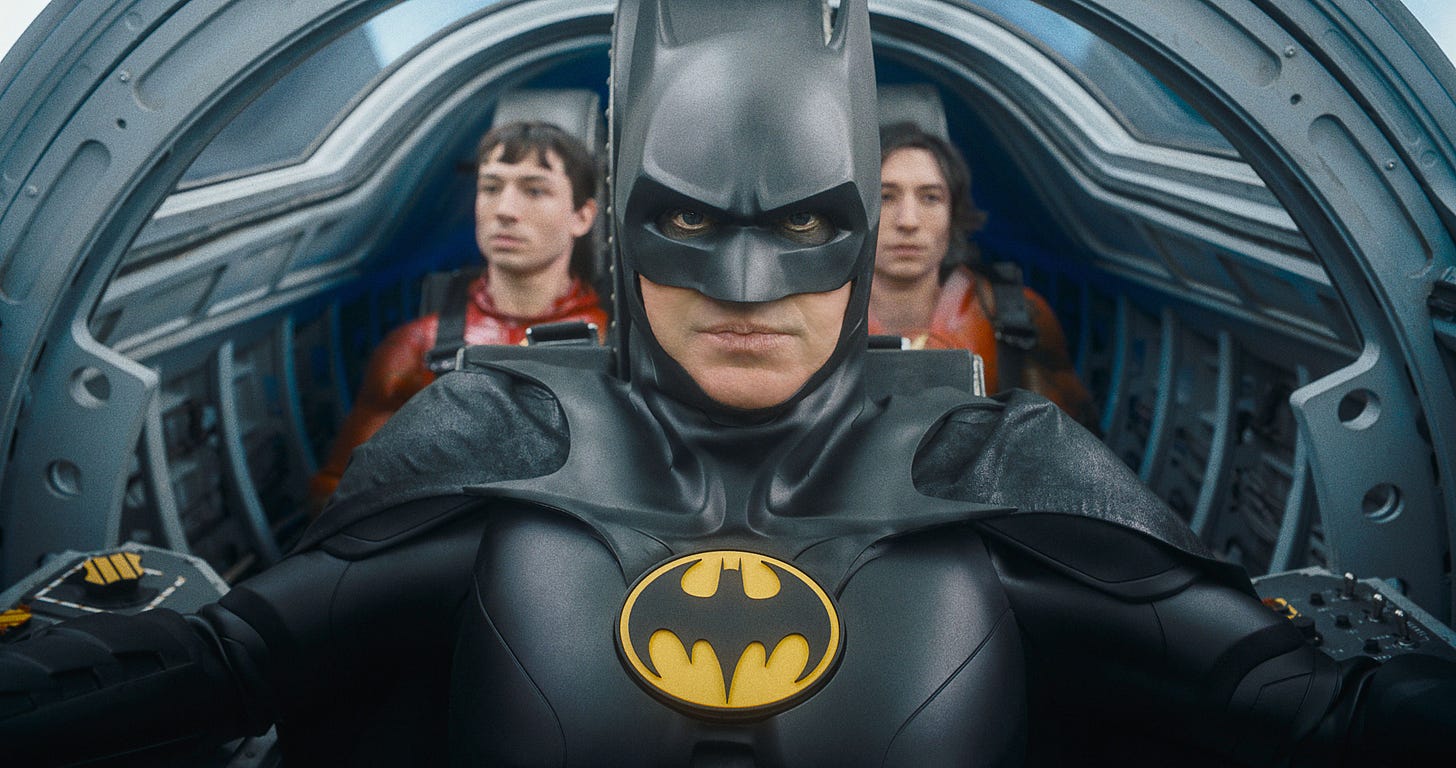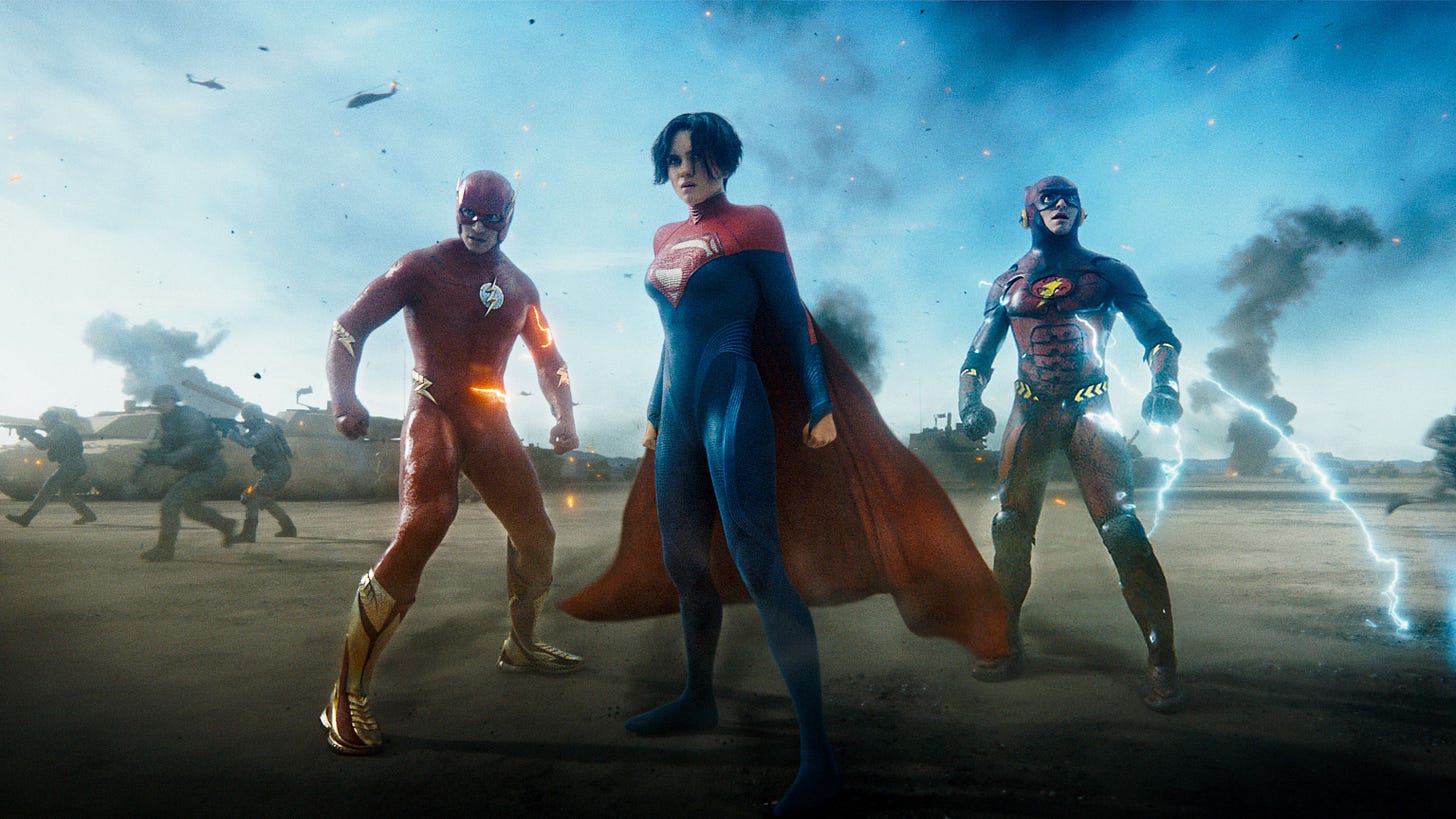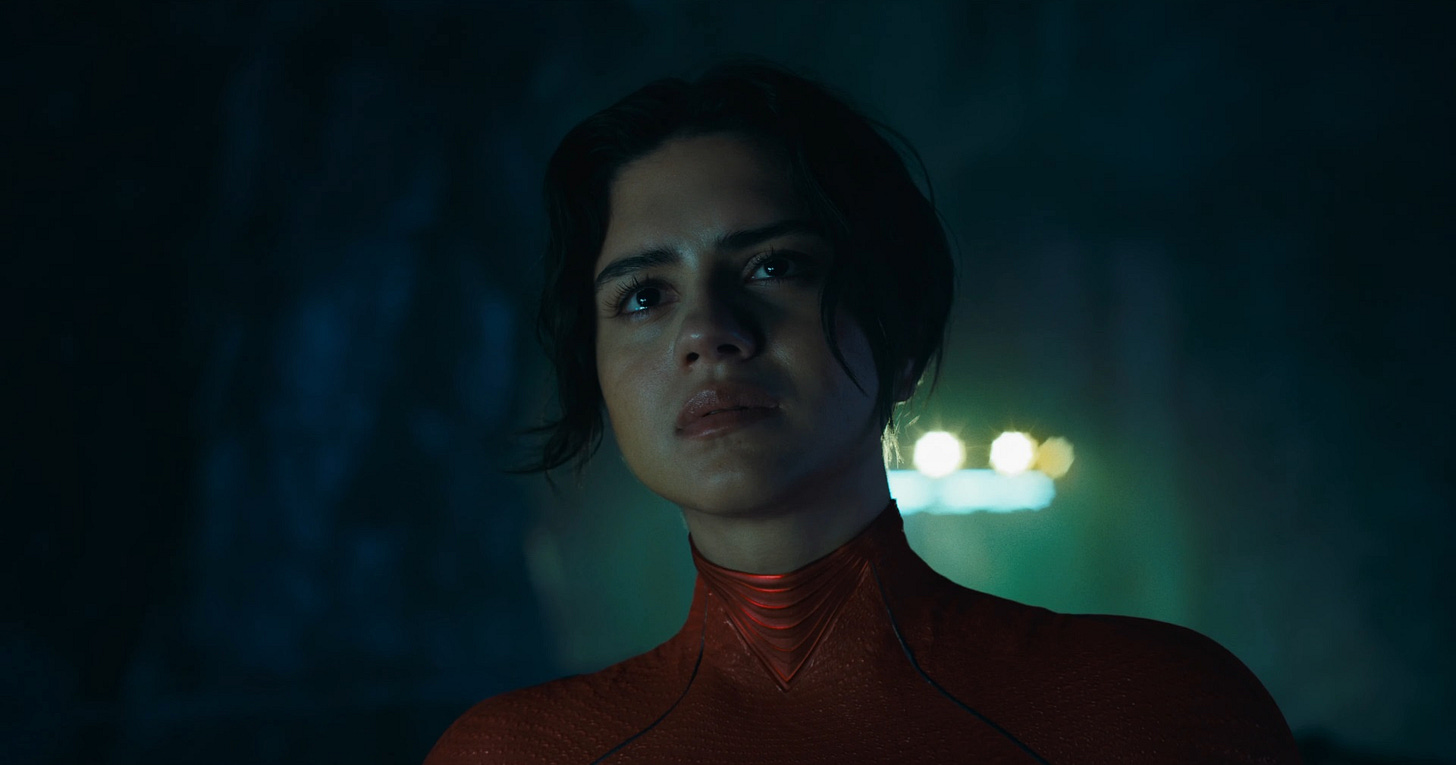The Flash is stuck in neutral.
He should have stayed at home. I wish I did.
Before the opening title card even appears on screen, The Flash, the long-in-development film based on the popular superhero, is fighting an uphill battle.
For one, the larger framework the movie is apart of won’t exist for much longer: back in January, freshly-appointed DC heads James Gunn and Peter Safran announced the new slate of projects that will, come 2025, bring an end to the continuity that most of the company’s movies, including this one, have been following since 2013’s Man of Steel.
Comic books have been doing this for decades now (the death of a new reality, bringing about the birth of a new one) and The Flash, inspired by Geoff John’s 2011 comic storyline, Flashpoint, tries to capture that particular style of storytelling even if brings with it, an inherent lack of investment on the part of the more-casual viewer. As in:
“Why should I care if none of this will matter going forward?”
Most serious though, is the seemingly endless controversy that has been following star, Ezra Miller, over the past three years. Miller (who uses they/them pronouns) has been accused of numerous wrongdoings, from disorderly conduct to allegations of grooming.
And try as one might, it is incredibly hard, in this particular case, to truly separate the “music from the artist”, so to speak: the enthusiastic, go-getter attitude of Miller’s Barry Allen (and ultimately, the movie itself) is caught in the impossible-to-escape shadow of their public persona.
It makes you wonder, on some level, why’d they even bother?
Because DC has been trying to make this movie, in some form or other, since 2016 and after shuttling the nearly complete Batgirl into the Phantom Zone for a tax write-off last year, they simply couldn’t afford to eat the loss on another big-budget effort.
So they said all the right things over the past few months, even as Miller’s PR storm basically engulfed the movie’s marketing campaign.
No matter what happened, they were getting this thing out the door.
The show must go on, after all. An almost-final goodbye to this particular era of DC movies before Gunn and Safran wipe the slate (mostly) clean (two are still on the docket for later this year, Blue Beetle and Aquaman and the Lost Kingdom).
Problem is, The Flash never really earns such a farewell. Nor does it deserve one either.
The Flash picks up with Barry Allen as an active member of the Justice League and still as motormouth-y as ever, working as a forensic analyst in Central City.
Yet he is haunted by his past: his mother (Maribel Verdú) was murdered when he was a child and his father, played by Ron Livingston, is in prison, wrongly accused of her death.
After discovering - by running really, really fast - that he has the ability to travel through time, Barry is determined to go back and save his family but in doing so, he cracks open the multiverse like a Faberge egg, putting the entirety of the space-time continuum in jeopardy (try saying that in your best Doc Brown voice: “Great Scott! You’ll create a major paradox!” Etc, etc).
Multiverse stories are en vogue at the moment, winning Oscars and pulling on the nostalgia-driven heartstrings, to the point that it is more or less expected that the audience knows what’s up.
Even so, Ben Affleck’s Batman, reprising the role for the fourth and (supposedly) final time, makes sure to warn his superhero protégée about the dangers of screwing with the universe and time travel both, although without such shenanigans, we wouldn’t have a movie.
Barry succeeds in preventing his mother’s murder but his changes to the timeline create a ripple effect that proves disastrous.
Now stuck in an alternate 2013, where the Justice League doesn’t exist and Micheal Shannon’s General Zod is preparing to invade Earth (as we saw depicted in Man of Steel) Barry must try to save this new world while also working to get back to his own.
To do so, he teams-up with:
A younger version of himself (also portrayed by Miller).
A far different Batman than the one he knows (Michael Keaton, returning to the role for the first time since 1992’s Batman Returns).
And Kara Zor-El/Supergirl (Sasha Calle, making her film debut). Who in this reality, is the Kryptonian of note, with her cousin Kal-El (Superman) having never made it to Earth.
Director Andy Muschietti tries to keep things moving the best he can. Visually, the action, for the most part, is crisp and clear.

Whenever Flash utilizes his super-speed, the screen explodes in a burst of vivid colour, an inspired choice that recalls the splash pages of the source material.
The film’s opening action sequence, featuring Barry trying to save those inside a collapsing hospital and a high-speed chase with Affleck’s Batman are both highlights, the characters, moving with a believable sense of energy, weight and fluidity.
Keaton’s Batman is also given some time in the spotlight, as is Calle’s Supergirl, who in one notable sequence, takes on an entire battalion of Russian military goons with ease.
Unfortunately, Muschietti can’t keep this momentum going.
The movie’s third act (of course) dovetails into a mess of CGI-ed, action-heavy sludge, coupled with some absolutely bizarre creative decisions (which I won’t spoil here) that left me totally and completely bewildered - and that takes a lot, I’m a pretty chill dude.
However, it is ultimately the writing that grinds The Flash to a halt.
And, to be fair, I don’t envy credited screenwriter Christina Hodson in the slightest, who must consider not just the story of one movie but a larger franchise, corporate machinations beyond her control and the introduction or even the re-introduction of various characters.
But it just doesn’t work.

The Odd Couple-esque bantering between Miller’s two Barry Allens quickly grows stale, even as Older Barry, acting as something of an audience surrogate, tries to acknowledge just how grating his younger counterpart is (super grating).
It doesn’t help that the overall arc and final resolution of Barry’s story can be inferred long before the credits roll, no doubt weakening its intended impact.
And without a doubt, that is the film’s biggest failing: that it is, in totality, Barry Allen’s story.
2021’s Spider-Man: No Way Home actually did a pretty good job, hitting the right notes with its multiverse-driven storytelling.
Tom Holland’s Peter Parker was (rightly) the focus, being the protagonist, after all.
But in bringing back various characters from Spider-Man films past, there was the worry that they would be subject to nothing but the marketing machine, being used to drum up hype but pushed to the side during the actual movie proper.
Instead, everyone got their time to shine.
From Tobey Maguire’s Peter taking on something of a mentor role, or Jamie Foxx’s Electro and Andrew Garfield’s Peter both getting moments of redemption, either in character or portrayal, after the more mixed reception of the Garfield-led Amazing Spider-Man films (which I love deeply, flaws and all but respect the criticism).
The Flash has no such luck.
I realized too late that Keaton’s Batman and Calle’s Supergirl were nothing but props in the larger Flash-centric story, hardly given anything beyond a few lines of dialogue to work with, despite their relatively limited screen time.
Calle especially, feels short-changed. Despite being featured heavily in the marketing, she only appears in roughly forty minutes of this two-and-a-half hour movie.

This is a shame. For Keaton, it is something of a missed opportunity.
He departed the Batman franchise after Returns, concerned with the creative direction the films were poised to take (which was a good call, as unforgettable as the Bat-Credit Card became) and his return to the cape and cowl is, in a word, underwhelming - despite his best efforts to bring some gravitas to a Bruce Wayne long-retired and pulled back into action.
But if nothing else, his portrayal in the first two Tim Burton-directed films can always be revisited, in addition to the Batman ‘89 limited series which disregards the films Keaton wasn’t involved with (Batman Forever, Batman & Robin) to tell the story as it was “originally” intended (Billy Dee Williams as Two-Face!).
For Calle though, this narrative sidelining borders on being straight-up disrespectful.
For one reason or another, Henry Cavil’s more sullen Superman never really clicked with the larger movie-going audience but Calle strikes a far better balance, bringing a tortured yet very wounded human energy to her portrayal of Kara which is simply outstanding - it is easily the best performance of the movie and the overall high water mark of the whole experience.
Yet we see so little of her, much to the movie’s and the audience’s deterrent. Her arc, as presented, is so beyond frustrating, I get the feeling the character’s story was a casualty of late-in-production editing - because there is no way anyone involved creatively actually thought ending the movie the way they did was a good idea.
The only hope is that she returns in the yet-to-be-developed Gunn and Safran-helmed Supergirl: The Woman of Tomorrow (based on Tom King’s acclaimed comic run of the same name).
She deserved a better movie.
So did the rest of us.





